The annual commemoration of Black History Month is officially celebrated during February within the United States and Canada. The significance of this tribute has led other nations to celebrate the African Diaspora at different times throughout the year including the Netherlands, Ireland, and the United Kingdom for example. These instances of wider tribute across the globe have been supported through the altruistic activities undertaken by Donald Payne, Sr., an alumnus of Seton Hall and New Jersey Congressman. Representative Payne was a noted advocate on behalf of education and human rights endeavors, but he also spent several years learning about, and lecturing upon a myriad of Black-centered history issues on both the local and international level during the course of his lifetime.
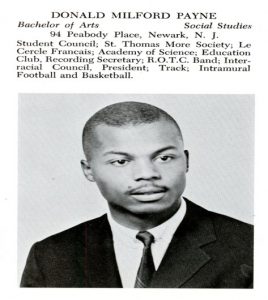
Donald Milford Payne (1934-2012) was a native of Newark, graduate of Barringer H.S., and an alumnus of Seton Hall University earning his diploma in 1957 prior to doing post-graduate education at Springfield College (MA). He was an executive at Prudential Financial Services; Vice President for Urban Data Systems, Inc., and also taught within the Newark Public Schools system prior to entering the political arena.
Congressman Payne spent a major portion of his public career as a United States Representative for the 10th District covering Newark, South Orange, and other neighboring communities from 1989-2012. He was a strong advocate on academic-related issues of various types including the School-to-Work Opportunities Act and National Literacy Institute. Counted among his many board-appointed accomplishments include a stint on the Democratic Steering Committee (2002) along with membership as part of the U.S. House Committee on Foreign Affairs. In addition, Congressman Payne was very active with peace negotiations in Northern Ireland and as a two-time (first ever individual re-appointed to this body twice) as a Congressional delegate to the United Nations (2003-2007) among other respected committee assignments.
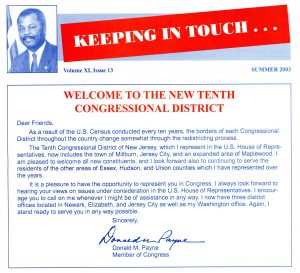
The work undertaken by Congressman Payne in Africa was particularly keen as he became an advocate for the citizens of Darfur, Sudan, the Western Sahara, and other parts of the continent as a former Chairman of the U.S. House Foreign Affairs Subcommittee on Africa and Global Health. In addition, a highlight included a six-nation tour of Africa with President Bill Clinton during the 1990s along with leading a separate political mission to Rwanda. Congressman Payne was also a member of the Board of Directors for the TransAfrica Forum, and involved himself with ending the Somalian conflict of the 2000s.
Congressman Payne was also a trailblazer in his own right as the first African American President of the National Council of Young Men’s Christian Associations (YMCA) during the early 1970s, and later as Chairman of the World YMCA Refugee and Rehabilitation Committee between 1973-81. He was also the earliest African American U.S. Congressman to represent any district in New Jersey history and served as the 14th Chair of the Congressional Black Caucus (founded in 1969) and first ever from the Garden State.
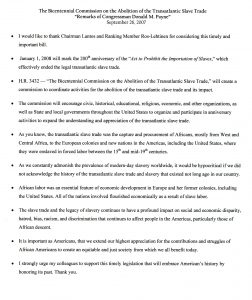
During the course of his life and legislative career in particular, Congressman Payne addressed noteworthy remembrances related to various African American individuals, institutions, events, and eras. Solemnity and respectful reflection in relation to such celebrations as Martin Luther King, Jr. Day and Douglass Day in addition to Black History Month. Congressman Payne also brought important perspective about his activities in the African American community to his alma mater and local constituents over the last several decades.
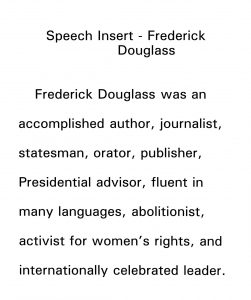
The most lasting memorial related to Congressman Payne from a Seton Hall perspective can be found within the preservation of his legislative records within the Monsignor William Noé Field Archives & Special Collections Center. School officials acquired his files in 2013, a year after his death. Various web pages and blog posts related to the local connections have been archived for public reference over the past decade . . .
Congressman Payne and Connections to Seton Hall University – https://www.shu.edu/search.cfm?q=donald+payne#gsc.tab=0&gsc.q=donald%20payne&gsc.page=1
Donald Payne Papers, Acquisition of Materials – https://blogs.shu.edu/archives/2013/11/the-donald-m-payne-papers-come-to-seton-hall/
Donald Payne Papers, Open to Researchers Announcement – https://blogs.shu.edu/archives/2014/09/donald-m-payne-papers-now-open-for-research/
Donald Payne Papers, Collection Inventory (ArchivesSpace) – https://archivesspace-library.shu.edu/repositories/2/resources/242
Within our collection, one can find that Congressman Payne left behind a significant amount of quality documentation in the form of legislative briefs, speeches, correspondence, and other informational contents of note. In more detailed terms, the Donald Payne Papers date from 1988-2012, and are primarily related to the legislation and advocacy of his lifetime of work. The Scope and Content notes from the Congressman Payne Papers reads in part:
“The collection includes materials related to . . . legislative work, particularly for the House Committee on Education and Labor and the House Committee on Foreign Affairs, as well as on behalf of his district and state . . . There are significant files of material on Congressman Payne’s trips abroad, which included trips to a number of African nations as well as nations in Europe and elsewhere . . . materials cover Congressman Payne’s years in Congress including his African journeys and diplomacy and international relations work, national and legislative process efforts a good study in congressional protocols in general and local and national representation in particular.”
Link to the Donald Milford Payne Papers Collection – https://archivesspace-library.shu.edu/repositories/2/resources/242
As outlined above, there are several areas of research value, but in this month of February, it is important to note his work within African nations in particular and on behalf of Black History in its varied forms. When conducting a search that involves “Black History Month” within this collection, the results page yields a number of different file folders that focus upon various tributes are documented within such formats including correspondence, notes, reports, memoranda, and other types of materials including details on the commemorations from 1995 and 1997 along with “Speeches 1989-2011;” “African American History, 1992-2011;” “Black History, Undated;” “Black History, 1990-1995; and other subject areas found across this assemblage.
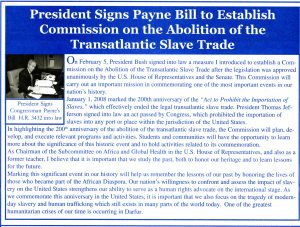
In more specific terms, Congressman Payne also left behind a myriad of background information on African American History along with specific files including speeches and background notes for his lecture appointments in particular. Examples include . . .
- Congressional Research Service – Black History Month (IP 344B) Library of Congress, Washington, DC. (* Opening Text: “Since 1976, February has been celebrated as Black History Month, but the origins of this event date back to 1926, when Dr. Carter G. Woodson set aside a special period of time in February to recognize the heritage, achievements, and contributions of African-Americans.” . . . Each year the Association for the Study of Afro-American Life and History selects a theme for the Black History Month celebration, and in 1995 it is “Reflections on 1895: Douglass, Du Bois, Washington.”)
- “Reflections on 1895: Douglass, Du Bois, Washington,” by Janette Hotson Harris, Ph.D., National President, ASALH Association for the Study of Afro-American Life and History (ASALH), 1995.
- CRS Report for Congress. “African-American Contributions To American Society in Selected Fields of Endeavor,” Corey Ali Jennings – Analyst in American National Government, Government Division. January 21, 1993. Congressional Research Service – The Library of Congress.
- Tangela G. Roe, Senior Bibliographer, Government and Law – Library Services Division. “Black History and Culture: Bibliography-in-Brief,” CRS Report for Congress. Congressional Research Service, The Library of Congress, January 13, 1995.
- Special Edition. Black History Is No Mystery. Special Edition, Winter 1993-94. Malcolm X, History of Black Spirituals, Frederick Douglass and W.E.B. DuBois, etc. Boston MA.
- Statement for Congressman Donald M. Payne. House Joint Resolution 320. Establishing the First Memorial Honoring African-American Civil War Veterans. Tuesday, June 9, 1992.
- Remarks – Black History Month. S. District Court – Trenton, February 14, 2006. Judge Anne Thompson, NJ State. MLK and Coretta Scott King. Homer Plessy v. Judge John H. Ferguson. Brown v. Board of Education, Civil Rights Acts of 1950s and 60s. Thurgood Marshall, Charles Hamilton Houston – Howard Law School Dean. Congressional Black Congress. South African Apartheid and International Human Rights, etc.
- Chairman Donald M. Payne – African American Civil War Memorial Breakfast – Draft #2 – African American Civil War Memorial and Museum – Washington, DC 9/21/2011.
- Remarks – Commerce Department, Black in Government. Including mentions of the first statewide African American Convention – Trenton Zion AME church (1849).
Resources created and saved by Congressman Donald Payne, Sr.* provide an insightful look at the African American experience and are available for reference to our entire research community.
Information about African American History, Congressman Payne, and Seton Hall University please contact us via e-mail at: Archives@shu.edu or by phone at: (973) 275-2378. Thank you in advance for your interest.
(* Looking both to the past and future, the work started by Congressman Payne lives on through the efforts of his son, Donald Payne, Jr. who was elected to Congress in 2012. Congressman Donald Payne, Jr. has been an important part of the House of Representatives over the course of his tenure and has made his own significant contributions to this body through his work with domestic issues, labor, and Homeland Security among other subjects of importance.)
